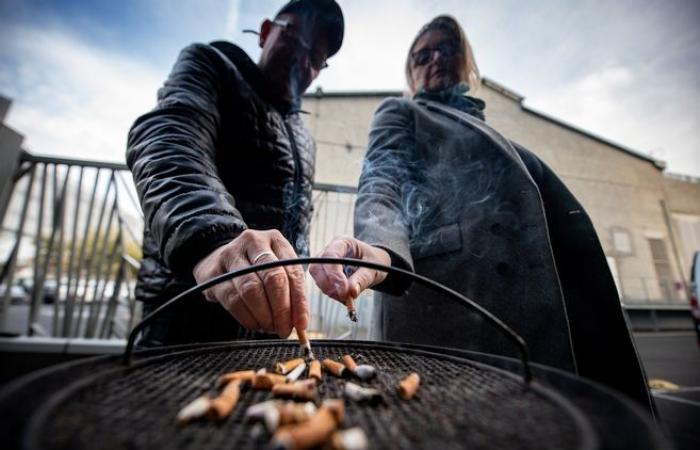
From her office located in the premises of the Sorbiers clinic in Issoire (Puy-de-Dôme), Géraldine Ducros, tobacco specialist at Afret, helps smokers to stop their consumption.
His voice is calm, soft, reassuring. In a small open office located at the entrance to the day reception of the Sorbiers d’Issoire clinic, Géraldine Ducros receives free of charge people wishing to give up their tobacco consumption. “Our association supports chronic illnesses. We couldn’t do that without talking about tobacco,” explains the tobacco specialist and coordinating nurse at Afret (Association for Training and Research in Therapeutic Education).
“I am completely a slave”: prisoners of cigarettes, these addicts testify on the occasion of No Tobacco Month
Two years ago, the structure took a major turn: in addition to raising awareness, it offers real support for stopping nicotine, thanks in particular to the training carried out by the coordinating nurse. “It is very difficult to wean yourself alone in your own corner. When you are accompanied, you have a 20 to 30% greater chance of stopping,” she assures.
There to “help overcome obstacles”
A conviction which therefore encourages the association to offer both individual and collective support. “To stop smoking, there are few rules. The main one is to achieve your goal,” she says. “The difficulty when you are alone when you quit is that, At times, we can be stuck. Together, we can overcome this obstacle and find plans B or C. There are as many weaning methods as there are patients.”
Very attentive, Géraldine Ducros therefore receives the candidates for arrest face-to-face during a first meeting. “We take a good hour together to discuss. Often, people have already tried to quit. So, we try to dissect and understand what worked or not.” A primordial attention which allows to define a method, again, individual.
Does the person want to stop gradually? Suddenly? What is the project behind it?
The tobacco specialist also takes care of the follow-up by initially offering one appointment per week over a period of one month. “It allows you to see what’s going on.” But also to respond to situations that could cause good resolutions to go up in smoke. “Sometimes there are small stresses in life, the goal is to think of a solution so as not to respond with cigarettes,” underlines Géraldine Ducros who can also prescribe tobacco substitution.
A personalized plan can help
During these interviews, the professional also carries out important work on preconceived ideas. “We identify the levers. And sometimes it helps to create a personalized plan by determining motivation, potential difficulties, how to provide comfort, but also identifying what we can change in our daily lives.”
Increased minimum wage, compulsory winter tires, lower gas prices… What changes from November 1st
But what the tobacco specialist recommends above all is to play down the drama of quitting. “Sometimes we make a big deal out of it. Some people even refuse obstacles for fear of what could happen. Nothing is serious, even if at first you only stop smoking half a year later. day, there is no small stop, everything is just stored experience.Several solutions exist to stop. Photo Fred Marquet.
Since the start of the year, Afret has followed around thirty people. Smokers or former smokers who have been able to take a small or big step towards quitting smoking. As Albert Camus said: “The path matters little, the will to arrive is enough for everything.”
Hypnosis, acupuncture, auriculotherapy… Is it effective for quitting smoking?
Other services. Locally, several other structures offer support for people wishing to quit smoking. The Addictions France Addiction Care, Support and Prevention Center (74, rue du 8-Mai) provides a multi-professional team. Contact: 04.73.71.29.29. Asalee nurses (Liberal team health action) can also take the time to treat chronic illnesses in Issoire and its surroundings. The Issoire Medical-Psychological Center (7, boulevard André-Malraux) also has a smoking cessation support service. Contact: 04.73.89.21.07. The Tabac info service platform is available everywhere in France on www.tabac-info-service.fr. It allows you to be put in contact with tobacco specialists.
Jean-Baptiste Bottle





